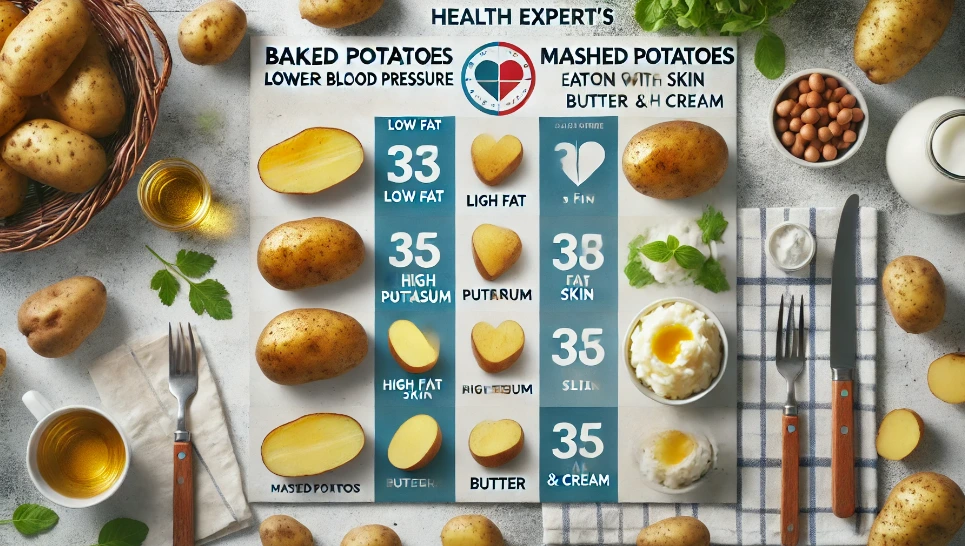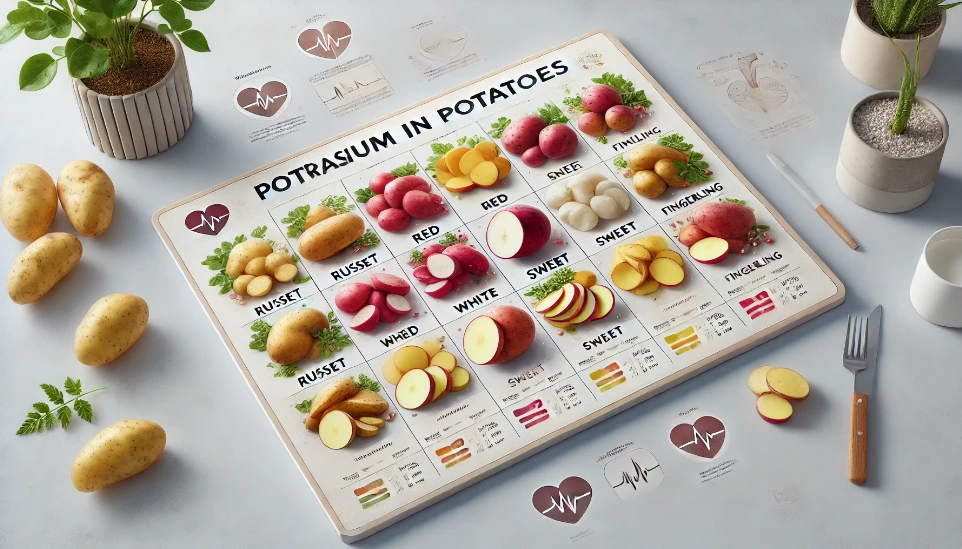Potatoes are a versatile and popular food across the world, and two of the most common ways to enjoy them are either baked or mashed. The debate around whether baked potatoes are healthier than mashed potatoes often boils down to factors like preparation methods, nutrient content, and how these dishes affect health markers like blood pressure.
In this article, we’ll explore the nutritional differences between baked and mashed potatoes, examine their potential effects on blood pressure, and weigh their pros and cons. Let’s dive in to understand which option might be the healthier choice, especially for those looking to manage their blood pressure.
Nutritional Profile of Potatoes
Both baked and mashed potatoes offer similar core nutrients as they come from the same vegetable. However, the way they are prepared influences their nutritional content and how they impact your health.
Basic Nutrient Comparison:
| Nutrient | Baked Potato (1 medium, ~173g) | Mashed Potato (1 cup, ~210g) |
|---|---|---|
| Calories | 161 kcal | 210 kcal |
| Carbohydrates | 37g | 31g |
| Dietary Fiber | 3.8g | 2.8g |
| Protein | 4.3g | 3.6g |
| Fat | 0.2g | 8.8g (if prepared with butter) |
| Potassium | 926mg | 654mg |
| Vitamin C | 28% DV | 19% DV |
| Vitamin B6 | 25% DV | 15% DV |
| Magnesium | 12% DV | 8% DV |
Key takeaways from the table:
- Calories: Baked potatoes are lower in calories than mashed potatoes, especially if the mashed potatoes are prepared with butter, cream, or other high-fat additions.
- Potassium: Baked potatoes are higher in potassium, a crucial mineral for blood pressure regulation.
- Fat content: Mashed potatoes, especially when enriched with butter and cream, tend to have a higher fat content.
Health Benefits of Potatoes
Before diving into which preparation is healthier, let’s look at the general health benefits of potatoes:
- Rich in Potassium: Potatoes are one of the best natural sources of potassium, which helps manage blood pressure by counteracting the effects of sodium in the diet.
- Good source of Vitamin C: Potatoes contribute significantly to your daily vitamin C intake, which is important for immune function and overall health.
- Contains Resistant Starch: Potatoes contain resistant starch, particularly when cooled after cooking, which acts as a prebiotic, feeding beneficial gut bacteria and improving digestive health.
The Impact on Blood Pressure: Baked vs. Mashed Potatoes
How Potatoes Affect Blood Pressure
Potatoes, due to their high potassium content, can be beneficial for managing blood pressure. Potassium helps to balance out the effects of sodium, reducing water retention and easing the pressure on blood vessel walls. However, the way potatoes are prepared can influence how much they help—or harm—blood pressure levels.
Baked Potatoes:
Baked potatoes, when consumed with minimal additions, can be a healthier option for those looking to manage their blood pressure.
- Low in Added Fats: Baked potatoes are naturally low in fat, and the absence of added butter or cream keeps the dish heart-friendly.
- High in Potassium: A baked potato contains a high level of potassium, which helps to reduce blood pressure by relaxing blood vessel walls.
- High in Fiber: If eaten with the skin, baked potatoes provide more fiber, which aids in digestion and helps maintain healthy blood pressure levels.
Mashed Potatoes:
Mashed potatoes are typically prepared with butter, cream, or milk, which increases the fat and calorie content. For people managing their blood pressure, this preparation style could pose certain risks.
- Higher in Saturated Fats: Butter and cream add saturated fats, which can raise cholesterol levels and potentially increase blood pressure if consumed frequently.
- Lower Potassium: The potassium content is slightly reduced due to peeling and mashing, which can make it a less beneficial option for lowering blood pressure.
- Higher in Calories: The additional fats can lead to higher calorie intake, contributing to weight gain, which is another risk factor for high blood pressure.
Pros and Cons of Baked Potatoes
Pros:
- Low in Fat: Baked potatoes, especially when prepared without toppings like butter or sour cream, are naturally low in fat.
- Rich in Potassium: One baked potato can provide nearly 25% of your daily potassium needs, which helps regulate blood pressure.
- Good Source of Fiber: Eating the potato with the skin adds extra fiber, which helps in maintaining a healthy digestive system.
- Fewer Calories: Compared to mashed potatoes, baked potatoes are lower in calories and can be a lighter option, especially when prepared simply.
Cons:
- Dry Texture: Some people find baked potatoes less palatable due to their dry texture, which might encourage the addition of unhealthy toppings like butter, cheese, or sour cream.
- Risk of Over-Seasoning: To improve flavor, baked potatoes are often seasoned heavily with salt, which can counteract the benefits of their high potassium content.
Pros and Cons of Mashed Potatoes
Pros:
- Creamier Texture: Many people enjoy the creamy, smooth texture of mashed potatoes, making them more palatable.
- Customizable: Mashed potatoes can be customized with different herbs, spices, and healthy additions like olive oil instead of butter.
- Comfort Food: Mashed potatoes are often seen as a comfort food, which can have psychological benefits during stressful times.
Cons:
- Higher in Calories and Fat: When prepared traditionally with butter, cream, or whole milk, mashed potatoes can contain a significant amount of fat and calories, which may contribute to weight gain and increased blood pressure.
- Lower Potassium: Peeling the potatoes before mashing reduces the fiber and potassium content, making it less beneficial for blood pressure management.
- Easily Overeaten: Because of their soft texture and rich taste, mashed potatoes can be easy to overeat, leading to higher calorie and fat intake.
Which is Better for Lowering Blood Pressure?
Based on the nutritional data and health considerations, baked potatoes emerge as the better option for lowering blood pressure, particularly when eaten with minimal toppings and skin-on. The higher potassium content and lower fat levels make baked potatoes a healthier choice for cardiovascular health.
How to Maximize the Health Benefits of Baked Potatoes for Blood Pressure:
- Keep the Skin: The skin of the potato is rich in fiber, which helps in managing cholesterol and blood pressure.
- Use Healthy Toppings: Instead of butter or sour cream, opt for healthier options like Greek yogurt, olive oil, or salsa.
- Limit Salt: Be mindful of how much salt you add to your baked potatoes, as too much sodium can negate the blood pressure-lowering benefits of potassium.
Conclusion: Are Baked Potatoes Healthier than Mashed Potatoes?
When it comes to managing blood pressure, baked potatoes offer clear advantages over mashed potatoes. They are lower in calories, contain more potassium, and can be prepared in a way that supports heart health. Mashed potatoes, while delicious, often come with added fats and calories that can counteract the beneficial effects of the potato itself.
For optimal health:
- Choose baked potatoes, and eat them with the skin for added fiber.
- If you prefer mashed potatoes, consider using healthier fat substitutes like olive oil or low-fat milk to reduce saturated fat content.
Both baked and mashed potatoes can be part of a balanced diet, but for those specifically looking to lower their blood pressure, baked potatoes prepared simply are the better choice.
Final Table Summary
| Factor | Baked Potatoes | Mashed Potatoes |
|---|---|---|
| Calories | Lower (161 kcal) | Higher (210 kcal with butter/cream) |
| Fat Content | Very low (0.2g) | High (up to 8.8g depending on preparation) |
| Potassium | High (926mg) | Lower (654mg) |
| Fiber | High (3.8g with skin) | Moderate (2.8g) |
| Ease of Overeating | Less likely | More likely |
| Blood Pressure Impact | Positive (low fat, high potassium) | Less favorable (high fat, lower potassium) |
By making mindful choices with how you prepare and consume your potatoes, you can still enjoy this popular food without sacrificing your heart health.



